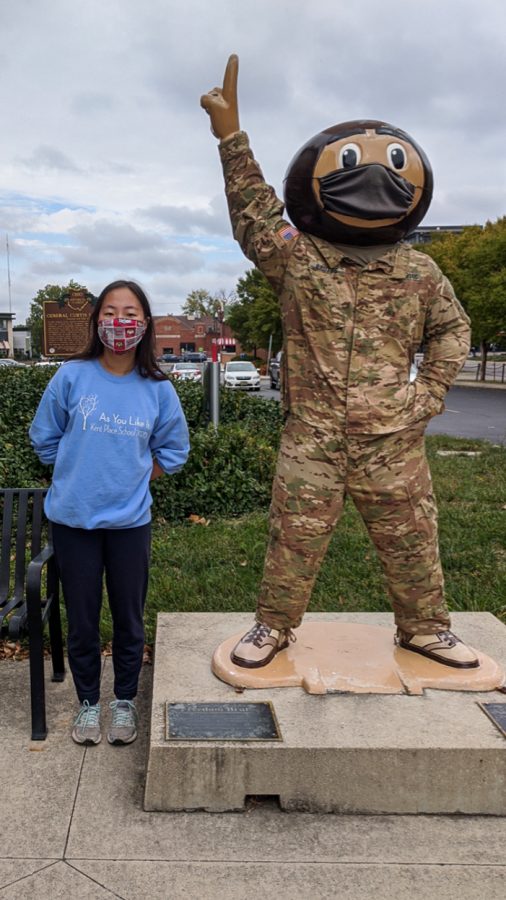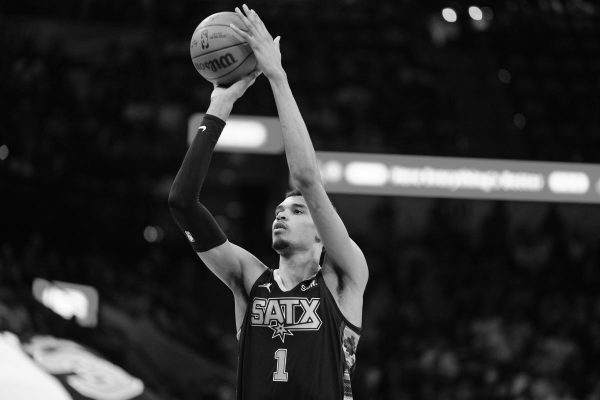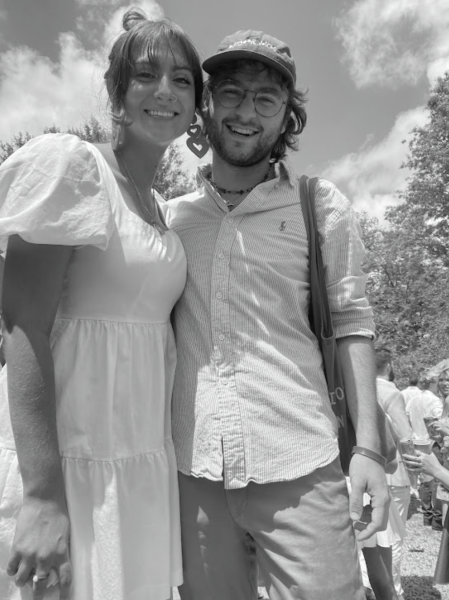Sports Journalism As Told By Editor on Autism Spectrum
Kayla Kim poses with a statue of Brutus Buckeye at The Ohio State University in October 2020.
Two months ago, I was formally diagnosed with autism spectrum disorder, concluding years of questions, tests, consultations, and confusion about who I was and why I had always felt so different. My reflections on my new diagnosis helped me answer a question that I’ve had since I started contributing to the Review: There are so many wonderful sections, so why do I love writing for Sports the most?
After all, sports was not something I always enjoyed. Throughout most of my childhood, I was unathletic, had difficulty working with others, and absolutely hated watching sports. For instance, whenever I was on the field for my recreational soccer team in second grade, I mostly stared at the sky or picked at clumps of grass with my cleats, much to the dismay of my teammates and coaches. I couldn’t see the fuss about what felt like an overcomplication of people tackling each other over a ball or running in an oval. Except for the Olympics, sports events such as the Super Bowl or the US Open felt like an inside joke everyone was in on that I couldn’t understand.
It wasn’t until junior year of high school that my interest piqued when I learned about Brutus Buckeye, the mascot for The Ohio State University, through a friend. Though initially bemused by his appearance — his head is a gigantic buckeye nut after all — somehow I was inspired by the way he brings joy to fans, such as by doing push-ups after touchdowns or rapidly pounding his head before games.
Thanks to Mr. Buckeye, I became a devoted Ohio State fan and soon realized that each game is more than just friendly competition, it’s a story that represents the best and worst of humanity. The cast of characters consists of everyone — not only the star kicker or team captain but also the bench players, the fans, the mascots, the people in sweaty mascot suits, and most importantly, anyone who has ever felt disrespected or ignored. These are the underdogs, the underappreciated recruits, the diehard supporters who find solace and comfort through their favorite teams or players, and people who overcome exceptional adversity to prove that they’re still standing. Cheering for sports means that you’re part of something much bigger than yourself — an expansive and historic collective and community.
This is an aspect I deeply connected with, especially as someone who has felt excluded in social circles and conversations, whether that be misunderstanding figurative language or feeling unable to connect with people who didn’t share an intense love for any special interest I could talk about for hours. But in the world of sports, my vast knowledge of Brutus Buckeye or March Madness isn’t judged or looked down upon — it’s celebrated. When I wrote my first piece for the Sports section in October 2021, an In the Locker Room interview, it was the first time in a while that I truly felt smart and capable of creating something meaningful.
My pride for my work has only grown as I’ve moved from Columnist to Production Editor to Contributing Sports Editor and now to Sports Editor for next semester. I learned to appreciate so much along the way. Although it can be confusing, I fell in love with carefully reading statistics, rules, and profiles for every sport. I fell in love with the art of production, scanning through every piece written for the paper that week for grammar, spelling, and style. I fell in love with the meticulous process of reading the articles in my section at least five times over and over again and drawing cats on the initial prints of pages. I fell in love with pitches, getting the chance every week to think outside the box and notice things that people typically overlook in athletics culture. I’m passionate about telling stories of those underrepresented in the Oberlin community and beyond, people such as Jim Fixx, OC ’57, the members of Oberlin College Taiko, and even participants in the recently formed pickleball league. Being an editor does not feel like work, but rather a natural extension of my mind and heart.
Nonetheless, I still face some challenges. Sometimes, I need to work in a less simulating space, such as a room with all the lights turned off or under a table. Even after years of practice, direct eye contact is still something I struggle with, so conducting interviews can be a little nerve-wracking. Like many autistic women, who are frequently underdiagnosed, I learned to “mask,” or suppress natural autistic reactions so I can do my best to fit in with a neurotypical world. In public, I avoid doing some actions such as speaking in a monotone voice or stimming. But this filter doesn’t always work. Occasionally when I go to games to report or spectate, I can observe too much — the blaring noise of the buzzer, the squeaky shoes on the gym floor, the texture of the seat, the greasy smell of a dining hall burger, the color of someone’s sweater, the glare of overhead fluorescent lights — and accidentally forget about the actual game. However, I think it gives me more vivid imagery to work with in my articles, and I’m proud of my ability to push outside my comfort zone.
I don’t know what the future holds for me if I go into sports journalism as a career, where there’s still a significant lack of diversity among reporters and editors. According to a report by The Institute for Diversity and Ethics in Sport, 79.2 percent of sports editors are white and 83.3 percent are male. Even if I decide not to pursue journalism, I’m in a world where 85 percent of autistic individuals with a college education are unemployed or underemployed. I don’t know how my peers, professors, friends, family members, future employers, and strangers will see me after reading this article. In fact, I’m still not completely sure how I see myself after receiving my diagnosis.
But no matter what happens, I will always be comforted by the work I have accomplished this semester, especially in collaboration with fellow editors College third-year Andrea Nguyen and fourth-year Zoe Kuzbari. Autism isn’t a dirty secret or a disease to be cured, it’s a unique part of myself that I get to embrace with every word I write and edit for this section. Thank you Sports for helping me find a voice, for connecting me to a community, and for celebrating an important part of me.




